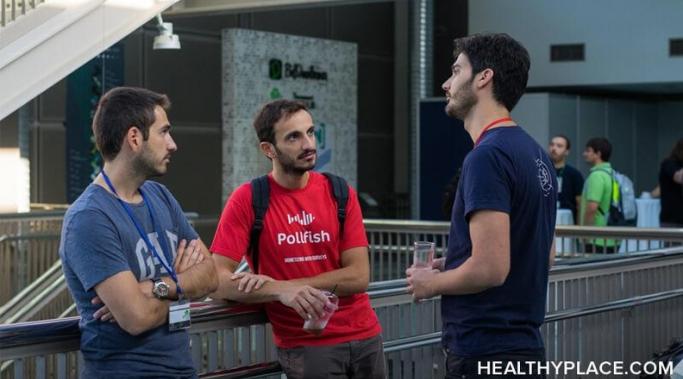Do you find that anxiety is causing you to avoid your life? Do you avoid people, places, situations, and events that, if it weren't for anxiety, you might actually enjoy? If so, first know that avoidance is a common and natural reaction to anxiety and is not a sign of weakness.
Anxiety-Schmanxiety
Anxiety affects us deeply and in many ways, including taking over our thoughts. Anxious thoughts can be loud, obnoxious, repetitive, and bothersome. They seem real and accurate. We think something; therefore, it must be true. In reality, however, our thoughts--especially anxious thoughts--aren't reliable. There are many different types of anxious thoughts that become repetitive patterns, and because they repeat in our heads, they feel very real. We come to believe them, and this affects our actions and overall happiness. Here's a look at one particularly bothersome anxious thinking pattern, all-or-nothing thinking, and an exercise to change these anxious thoughts.
Today is one of those days when I woke up anxious for what seems like no real reason. This happens on occasion, but every time it does it catches me off guard. Between the overall feelings of anxiety and feeling powerless and surprised when it happens, it’s hard to even get out of bed on days like this. One of the ways I deal with this feeling of stress and powerlessness is to return to a small collection of music, movies, and video games that occupy a special place in my heart.
Relationships of all types are important in our lives, but as positive as it is to have a connection with someone, relationships can also be incredibly anxiety-provoking. Choosing what we pay attention to can go a long way toward reducing anxiety in relationships.
Recently, we were hit with a period of deep cold that often made it dangerous to do anything outside. Ordinarily, I don’t mind the cold, but in these instances, where it is inadvisable to go outside for one’s safety, it can be difficult.
Do you play tug-of-war with your anxious thoughts? I often find myself playing this exhausting, time-consuming game, and it can be frustrating. If you find yourself trying to let go of anxious thoughts, but they keep returning, you could be playing mental tug-of-war with anxiety. It's something that happens automatically and repeatedly, but you don't have to play. If you tend to overthink, playing tug-of-war too often, and would rather do something else, read on for insights into this annoying mental game and ways to put down the rope.
Those who read this blog may remember that it was a little over a year ago that I lost my apartment, almost all my possessions, and nearly my life in a massive fire. In the year since the fire, I have tried my best to return my life to some degree of normalcy. This has proved to be much more difficult than I could have imagined. Having never had to come to terms with a traumatic experience such as this, I’ve learned that the aftereffects of such traumas can be surprisingly unexpected.
We may be social creatures, but other people certainly can cause anxiety. Social anxiety is largely about being around (or even thinking about being around) others and a host of worries related to others' perceptions of us. Even if you don't experience social anxiety, other people can be difficult to deal with and cause worry, agitation, or general angst. Regardless of what type of frustration or anxiety some people might be causing in your life, you don't have to let them continue to negatively impact you. Here are three ways to deal with any type of anxiety about other people.
Taking steps to overcome anxiety is a positive action, but do you need a break from trying to reduce your anxiety? Learning about anxiety, gathering tools to beat it, and using those strategies in daily life are healthy initiatives to take charge of your mental health and wellbeing. When you take these steps, you empower yourself to break free from anxiety.
I’m far from the first person to discuss the above topic. However, I feel it is important to continually raise awareness of the social causes of anxiety until those causes are recognized more broadly.









